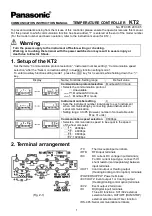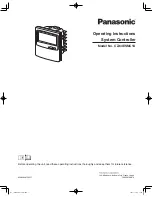
ZENER 8000-V Installation Manual
IM00165
19
characteristic in a general sense rather than a formal specification. Please consult the manufacturer of the
particular device regarding expected behaviour and suitability for your application.
The expected value of capacitive leakage current by the RMS(300Hz LP) method can be estimated as:
1.5mA RMS for each 1nF of total stray capacitance
For example, a system with a total motor and cable capacitance of 100nF could be expected to have a capacitive
leakage current of 150mA evaluated by this method, under the given conditions.
Notes
1.
The total stray capacitance is measured between all phases of the motor and motor cable connected
together and ground.
2.
This estimation is based on maximum DC bus voltage (as may occur during rapid deceleration), PWM
switching frequency 1KHz and other conditions selected to maximise the RMS(300Hz LP) value.
3.
The true RMS value of the capacitive leakage current will be
significantly higher
than the RMS(300Hz
LP) value because the RMS(300Hz LP) evaluation excludes higher frequency components.
4.
There are potentially a number of different reasons to evaluate the impact of earth leakage currents in
an installation. The evaluation method selected each should be appropriate to that reason. It is unlikely
that a single evaluation method will meet all requirements.
Contact Zener for additional information.
Earth leakage monitoring instruments / devices
The following notes may be of assistance in selecting appropriate devices:
1.
The measurement bandwidth of the device will have a significant influence on the leakage current
indicated because the actual capacitive leakage current will contain a wide range of frequencies. We
suggest that the device bandwidth should be selected based on the particular risks to be managed.
2.
Earth leakage monitoring instruments / devices are potentially exposed to all frequency components of
the leakage current, not just those that pass through any internal low-pass filter. Check instrument /
device suitability with the manufacturer.
3.
An insulation fault between the inverter module DC link and earth, could in theory at least, produce an
earth fault current with a DC component. The issue is that an earth fault with a DC component may not
be recognised by, or might otherwise de-sensitise, an AC-only earth leakage monitoring device. The
inverter module DC link is entirely internal to the inverter module and not connected to field wiring or
available at any terminal of the inverter module to minimise the opportunity for such a fault. In view of
this construction we believe the possibility of a fault of this nature to be remote. We understand that
earth leakage monitoring devices that include a DC capability are available.
















































